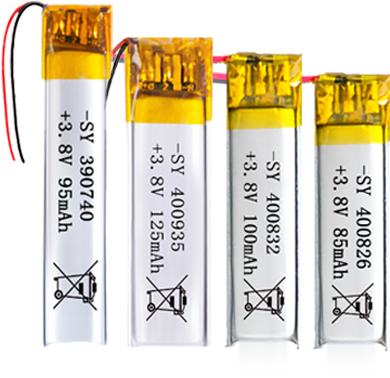Smart Bluetooth glasses need lightweight and efficient batteries1. Choosing the wrong battery supplier can lead to safety issues, performance problems, and short lifespan.
To select the best manufacturer, consider energy density, reliability, customization, safety certifications2, and cost-effectiveness. A high-quality supplier ensures long battery life and smooth performance.

Many manufacturers claim to offer the best batteries, but how can you verify their reliability3? Let's explore the key factors to consider.
Table of Contents
ToggleWhy Are Small Lithium-Ion Batteries Essential for Smart Bluetooth Glasses?
Battery weight and size directly affect the user experience. A poor battery choice can make glasses bulky or unreliable.
Small lithium-ion batteries4 offer high energy density, a compact design, and long life, making them ideal for smart Bluetooth glasses. They ensure efficient power without adding weight.

Key Features of Lithium-Ion Batteries
| Feature | Benefit |
|---|---|
| High Energy Density | Enables longer battery life |
| Ultra-Thin Design | Fits into compact frames |
| Fast Charging | Reduces downtime |
| Custom Shapes | Fits various eyewear models |
| Safety Mechanisms | Prevents overheating and short circuits |
What Factors Should You Consider When Choosing a Battery Manufacturer?
Not all battery manufacturers meet the same quality standards. A wrong choice can lead to frequent failures or safety hazards.
A reliable manufacturer provides high-quality batteries5, strict safety standards6, and customization options. They also have strong production capabilities and a proven track record7.

Essential Evaluation Points
-
Battery Performance
- Capacity range: 50mAh - 150mAh, suitable for smart glasses.
- Energy density8: Maximizes power while minimizing size.
- Cycle life: Should exceed 1000 charge cycles.
- Fast charging support9: Reduces charging time.
- Safety features: Includes short-circuit, overcharge, and thermal protection.
-
Manufacturing Capabilities
- Monthly production output10: Can they handle bulk orders?
- Automated production lines11: Ensures consistent quality.
- Quality control measures12: Includes raw material inspections and final product testing.
How to Evaluate a Manufacturer's Quality Control and Production Capacity?
A poor-quality battery can fail unexpectedly, damaging your brand and customer trust.
A strong manufacturer follows strict quality control protocols13, ensuring reliable and safe batteries through automated testing14 and compliance with international standards15.

Key Quality Control Steps
| Stage | Purpose |
|---|---|
| Incoming Material Inspection (IQC) | Ensures raw materials meet standards |
| In-Process Quality Control (IPQC) | Identifies defects during production |
| Final Quality Control (FQC) | Verifies product performance |
| Outgoing Quality Control (OQC) | Ensures only defect-free batteries are shipped |
What Customization and R&D Capabilities Should a Manufacturer Have?
Standard battery sizes often don’t fit smart glasses, requiring custom solutions.
A good manufacturer provides customized battery shapes, flexible voltage options, and advanced Battery Management Systems (BMS) to fit unique product designs.

Customization Features to Look For
- Ultra-thin designs: 0.5mm thickness for seamless integration.
- Curved or irregular shapes: Matches smart glasses’ frame design.
- Flexible capacity options: Optimized for different power demands.
- Custom BMS solutions: Enhances battery safety and longevity.
How Do Certifications and Compliance Impact Battery Selection?
Unsafe batteries can overheat or explode, causing serious risks.
Certifications prove that a manufacturer meets safety and environmental standards, ensuring battery reliability and compliance with legal regulations.

Important Certifications
| Certification | Purpose |
|---|---|
| UL 1642 | U.S. safety certification for lithium batteries |
| UN38.3 | Ensures safe battery transportation |
| IEC 62133 | European safety compliance |
| RoHS & REACH | Restricts hazardous substances in production |
What Are the Cost, Lead Time, and After-Sales Considerations?
Even a great battery is useless if delivery is slow or support is poor.
A reliable manufacturer offers fair pricing, fast production16, and responsive after-sales support17 to ensure a smooth supply chain.

Key Considerations
-
Pricing & Bulk Discounts
- How does pricing compare across suppliers?
- Are volume discounts available?
- Does cost match performance and reliability?
-
Lead Time & Delivery
- What is the average production lead time?
- Do they offer urgent production for fast delivery?
- How do they manage shipping logistics?
-
After-Sales Support
- Do they provide warranties for defective products?
- Is technical support available?
- What is their return and replacement policy?
Conclusion
Selecting the right lithium-ion battery manufacturer ensures optimal performance, safety, and long-term reliability for smart Bluetooth glasses. By evaluating battery quality, customization, safety certifications, and pricing, manufacturers can make informed decisions that benefit their business.
-
Explore this link to discover top battery options that enhance performance and safety for your smart devices. ↩
-
Exploring safety certifications helps ensure that the batteries meet industry standards for safety and reliability. ↩
-
Learn about testing standards and certifications that ensure battery reliability and performance. ↩
-
Explore this link to understand how lithium-ion batteries enhance performance and efficiency in smart devices, including glasses. ↩
-
Exploring this link will help you find reliable manufacturers known for their high-quality batteries, ensuring safety and performance. ↩
-
Understanding safety standards is crucial for selecting a battery manufacturer that prioritizes safety and reliability. ↩
-
This resource will guide you on assessing a manufacturer's history and reliability, ensuring you make an informed choice. ↩
-
Energy density is vital for compact designs. Learn how it affects battery efficiency and device performance by checking this resource. ↩
-
Fast charging can significantly enhance user experience. Discover the advantages and technology behind fast charging in batteries. ↩
-
Understanding monthly production output helps assess a manufacturer's capacity to meet demand and handle bulk orders effectively. ↩
-
Exploring automated production lines reveals how technology enhances efficiency and ensures consistent product quality. ↩
-
Learning about quality control measures is crucial for ensuring product reliability and customer satisfaction in manufacturing processes. ↩
-
Understanding quality control protocols can help you ensure the reliability and safety of batteries, protecting your brand and customer trust. ↩
-
Explore how automated testing enhances battery quality and safety, which is crucial for maintaining customer trust and brand integrity. ↩
-
Learn about international standards in battery manufacturing to ensure compliance and enhance product reliability, safeguarding your brand reputation. ↩
-
Exploring the effects of fast production can enhance your knowledge of supply chain management. ↩
-
Learning about the significance of after-sales support can improve customer satisfaction and loyalty. ↩

